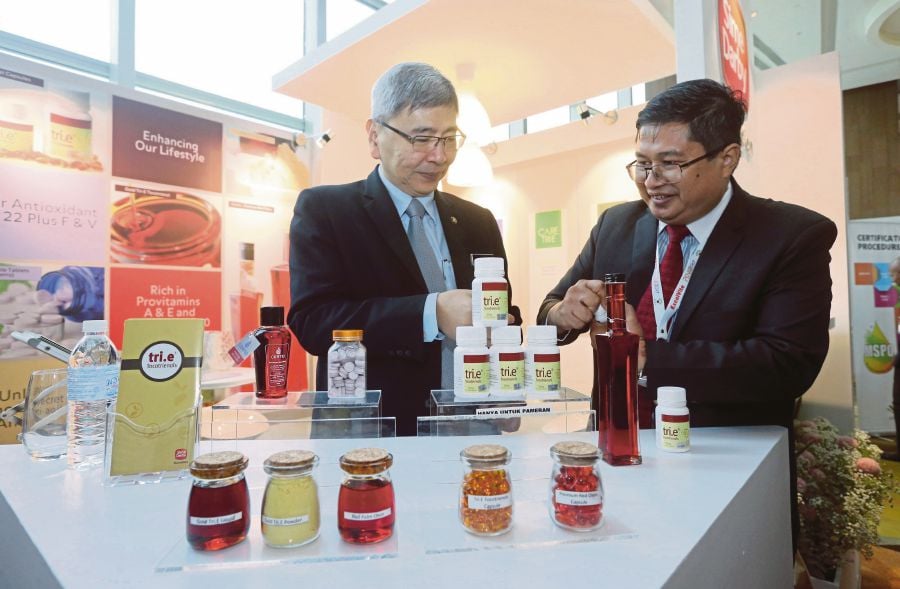The 40-year gap between the discoveries of tocopherols and tocotrienols means the former gets a lot more attention, according to American River Nutrition founder Dr. Barrie Tan.


The 40-year gap between the discoveries of tocopherols and tocotrienols means the former gets a lot more attention, according to American River Nutrition founder Dr. Barrie Tan.

SEPANG: Malaysia’s annual RM70 million palm oil vitamin E exports to the global pharmaceutical industry are set to expand, as medical studies show that it lowers bad cholesterol levels, kills cancer cells and protects our brain against the debilitating effects of a stroke.
“As more medical studies (discover) the benefits of palm oil vitamin E, the future is bright for mankind,” said Plantation Industries and Commodities Minister Datuk Seri Mah Siew Keong.
“Malaysia’s Health Ministry has just released its sampling study on the country’s 30 million population consuming palm oil in their daily diet. The results affirmed that consuming palm oil doesn’t have any adverse effect on our heart’s health,” he said.

The vitamin E alpha-tocopherol is imperative to a baby’s nervous system development, and they primarily get this from breast milk or formula. In a clinical trial, researchers from Abbott Nutrition found that there might be a difference in how synthetic versus natural alpha-tocopherols reach an infant.

Zebrafish deficient in vitamin E produce offspring beset by behavioral impairment and metabolic problems, new research at Oregon State University shows.
The findings are important because the neurological development of zebrafish is similar to that of humans, and nutrition surveys indicate roughly 95 percent of women in the U.S. have inadequate intakes of this critical micronutrient.
The problem may be exacerbated in women of child-bearing age who avoid high-fat foods and may not have a diet rich in oils, nuts and seeds, which are among the foods with the highest levels of vitamin E, an antioxidant necessary for normal embryonic development in vertebrates.

Untreated or poorly treated sleep apnea leaves you tired all the time and suffering from excessive daytime sleepiness and other sleep apnea symptoms. Use of the continuous positive airway pressure device or CPAP mask has been the gold standard of cures for sleep apnea over the past 25 years. But because of the discomfort of wearing the device, 20 to 50 percent of those who try it cannot tolerate this sleep apnea cure. Fortunately there are alternative ways for how to cure sleep apnea.

Dr. Barrie Tan, founder of American River Nutrition and notable expert in the field of vitamin E tocopherols and tocotrienols, recently presented a live web seminar to the members of the American Academy of Nutrition and Dietetics entitled Vitamin E: Setting the Record Straight.
Consuming walnuts could help lower the risk of cardiovascular diseases by improving endothelial function, according to new Chinese analysis, which didn’t find the same specific effect from almonds, hazelnuts or pistachios.

Memory, attention and focus, development, mood; there are numerous ways that a nutrient or bioactive ingredient can affect cognitive health. But which have the most science, how do they work?

Supplementation with antioxidants like vitamin E could reduce the excretion of a specific protein in patients’ urine, which is an early sign of diabetic kidney disease (DKD), say researchers.

Helicobacter pylori (H. pylori) can cause a wide range of problems, from chronic gastritis, peptic ulcer disease, iron deficiency anemia, and stomach cancer to diseases of the liver, cardiovascular system, skin, and many other body systems. If you suffer from this infection, an H. pylori natural treatment plan can be a safe solution. H. pylori infection is closely linked to coronary heart disease, rosacea, asthma, Parkinson’s disease, migraines, and fibromyalgia.
Herbal extracts and phytonutrients, many with antibacterial actions, are often used by natural practitioners to help eradicate H. pylori. itamin C, vitamin E, and selenium supplementation will help lower your risk of dying from stomach or esophageal cancer after H. pylori infection has been treated. This combination of antioxidant nutrients was studied in a large placebo controlled trial involving thousands of people with H. pylori.
